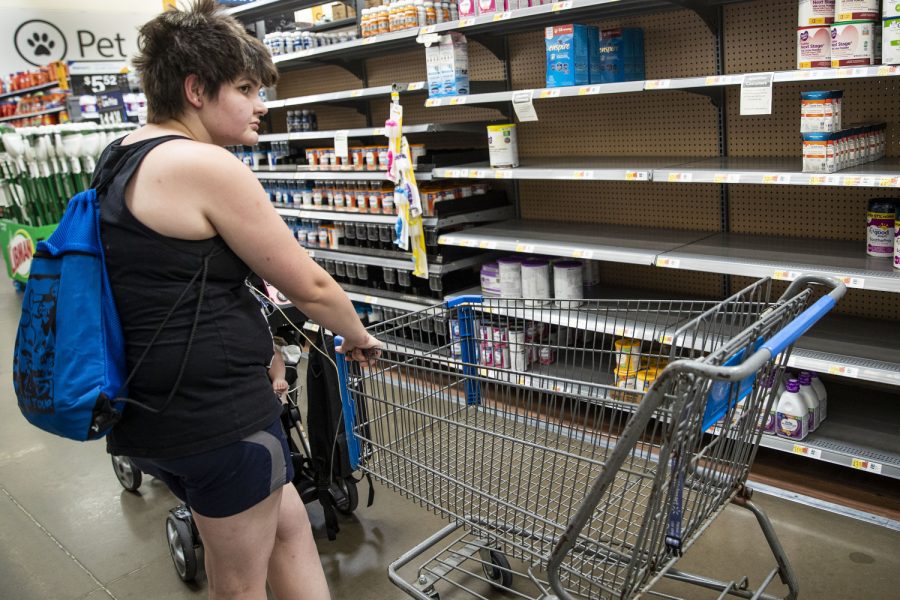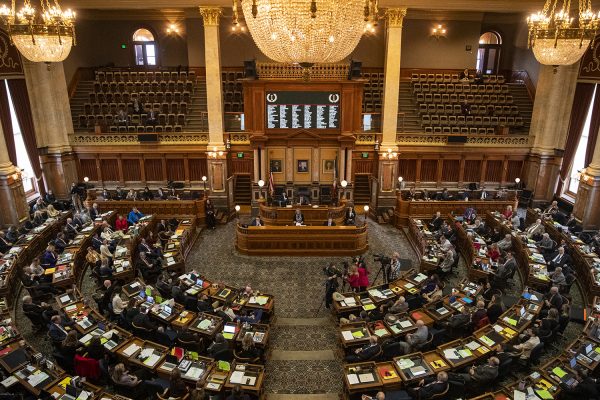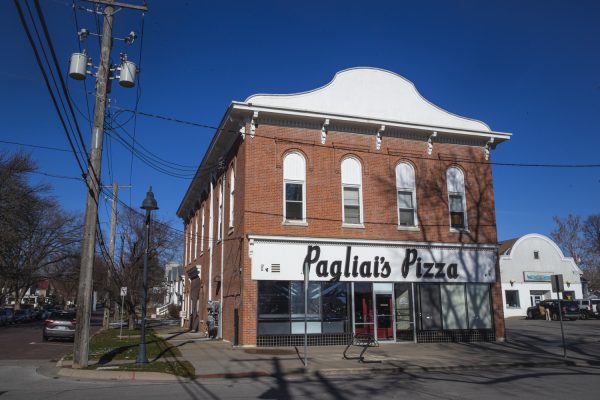Formula shortage prompts Iowa parents to explore alternative options
A University of Iowa Stead Family Children’s Hospital Project is a beacon of light as the nation deals with a formula shortage.
Alexandra Frost observes empty shelves where baby formula normally sits at a grocery store in Iowa City on Wednesday, June 22, 2022. “The world should not be working like this,” Frost said.
June 28, 2022
The nationwide baby formula shortage has caused Iowa families to find other ways to feed their babies.
This crisis affected families all throughout the month of May, resulting in over 40 percent of formula brands being out of stock in stores.
Alexandra Frost, assistant teacher at Lionheart Early Learning Center, and a mom whose child was affected by the baby formula shortage, said at the beginning of the shortage, she was still able to find formula for her son at stores.
“Then it just got worse and worse and worse and every time you went to the store, it was like, okay, this one doesn’t have any formula and then you’d have to go to the next one and the next one and the next one,” Frost said. “Eventually it got to the point where none of the stores had any of the special formulas my son needed.”
The U.S. Department of Health and Human Services advises families to look for safe alternatives to deal with the effects of the shortage, including buying formulas from other countries or talking to pediatricians about alternatives.
Frost’s son has stomach problems, and, because of the shortage, she has had to change her son’s formula five times, causing him to lose weight and experience worsening stomach issues, including vomiting.
A solution for the shortage presented by the Department of Human Services is using breast milk as an alternative. Frost attempted to feed her son by breastfeeding him but was unable to come up with enough to feed him.
“I tried to go back to pumping, but my milk supply would not come back. So we kept trying to switch and we were basically having to use whatever we could find and it was making him really sick,” Frost said. “…it was very hard.”
The University of Iowa Stead Family Children’s Hospital’s Mother’s Milk Bank of Iowa is an organization that collects, stores, and distributes human milk to babies in need of milk.
Jean Drulis, director and co-founder of Mother’s Milk Bank of Iowa wrote in an email to The Daily Iowan that the bank had dispensed more milk in May than any other month in 2022.
“We are experiencing an increase in milk donors who mention the formula shortage and their desire to help.” Drulis wrote. “We are always in need of more donors and so appreciate their goodwill.”
All milk donated to the Mother’s Milk Bank of Iowa is pasteurized and tested for bacteria and is an accredited milk bank of the Human Milk Banking Association of North America.
Vickie Brandenburg, owner of Lionheart Early Learning Center, said breast milk is best when it comes to feeding a baby but understands it isn’t always an option for everyone or there is a preference for formula.
“I personally say, you know, a fed baby is what is important, whether it’s breast milk or whether it’s formula doesn’t matter. They just need to be a fed baby,” Brandenburg said.
Lionheart Early Learning Center was not vastly affected by the formula shortage as the majority of their kids are breastfed, but is working to support Frost and her family to try to find alternatives to formula.
“If they’ve gotten any emails from [the Department of Human Services], they were reaching out to let us know everything they were hearing they were passing along to try and help,” Frost said. “Even as a daycare center, there’s not much anyone could do because the formula just wasn’t being produced.”
The Iowa Department of Public Health said parents should not use homemade alternatives which do not include minerals and vitamins. And, the United States Food and Drug Administration has released a press release highlighting its efforts to combat the shortage.
“Babies have to be fed. So if they can’t get a formula, then there has to be another option. Babies can’t go hungry,” Frost said.















